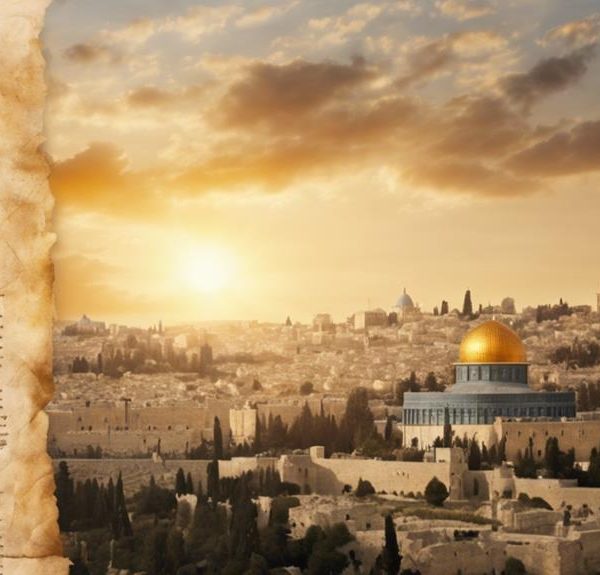Learn about the mysterious Book of Remembrance in the Bible, and uncover its ancient secrets that still impact our understanding today.

Book of Remembrance in the Bible
You've likely heard theories about the Book of Remembrance mentioned in the Bible, but have you ever questioned its true significance and origins?
This ancient concept, found primarily in Malachi 3:16, invites a fascinating exploration into its symbolic meaning and the roles it plays in theological interpretations.
Beyond its biblical origins, the Book of Remembrance carries profound personal and collective implications, offering insights into modern relevance and application that may surprise you.
Join us as we uncover the layers of meaning behind this intriguing biblical reference, revealing connections that could transform your understanding of memory and divine recognition.
Key Takeaways
- The Book of Remembrance serves as a metaphor for divine awareness and moral accountability.
- It signifies the omnipresence and omniscience of the divine, highlighting divine justice.
- This concept encourages individuals to live in alignment with moral and spiritual values.
- It fosters community cohesion by anchoring communal values and guiding moral decision-making.
Biblical Origins and References

In examining the biblical origins and references of the Book of Remembrance, it's crucial to delve into the contexts within which it's mentioned, primarily in the Old Testament, to understand its significance and purpose in the narrative. This exploration reveals much about the historical context and cultural influences that shaped its inclusion and role in biblical texts.
The concept of a Book of Remembrance is deeply rooted in the ancient Near Eastern tradition, where recording deeds, especially those of kings and gods, was a common practice. This cultural backdrop illuminates why such a concept found resonance within the Hebrew Scriptures. Specifically, in books like Malachi, where the Book of Remembrance is mentioned, you're seeing a reflection of the societal and religious practices of the time—where memory and record-keeping were intertwined with divine justice and covenant.
Understanding this concept requires recognizing the historical layers and cultural nuances that influenced its representation. The biblical references serve not just as theological constructs but as windows into the lived experiences and spiritual aspirations of ancient communities. You're not just reading about a divine ledger but engaging with a complex symbol shaped by its historical and cultural milieu.
Symbolic Significance

Delving into the symbolic significance of the Book of Remembrance, you'll uncover its role as a metaphor for divine awareness and moral accountability within the biblical narrative. This divine ledger isn't merely a list; it's an eternal record of human deeds, signifying that nothing escapes divine notice. The concept transcends mere historical documentation, embodying the idea that every action, whether seen or unseen by others, is meticulously noted in this celestial archive.
The presence of such a book in biblical texts serves as a poignant reminder of the omnipresence and omniscience of the divine. It underscores the belief that every individual's deeds are subject to divine scrutiny, emphasizing the importance of living a life aligned with moral and spiritual values. The Book of Remembrance, therefore, functions as a powerful symbol of the unbreakable link between human conduct and divine awareness.
Moreover, this eternal record highlights the theme of divine justice, suggesting that righteous acts won't be forgotten and will ultimately be rewarded. It carries a deep symbolic weight, reinforcing the idea that moral integrity and faithfulness are of eternal significance. Through this lens, the Book of Remembrance becomes a compelling expression of the underlying moral fabric of the biblical worldview.
Theological Interpretations

Exploring the theological interpretations of the Book of Remembrance opens up a rich discourse on its significance within various religious traditions and how it shapes our understanding of divine justice and human morality. This concept, deeply embedded in scriptural texts, serves as a nexus between divine accounting and the moral actions of individuals.
- Divine Witness: It underscores the belief in a God who isn't just a passive observer but actively records human deeds. This divine accounting implies a meticulous attention to both the actions and intentions of individuals.
- Moral Accountability: It reinforces the idea that every action, no matter how insignificant it may seem, bears weight in the divine ledger, promoting a sense of personal responsibility among believers.
- Eschatological Promises: The Book of Remembrance is often linked with eschatological promises, suggesting that those recorded within its pages are destined for divine favor in the afterlife, thus intertwining moral conduct with ultimate spiritual rewards.
- Community and Covenant: It also reflects on the communal aspect of faith, where remembrance serves as a covenant between the divine and those who uphold moral righteousness, creating a collective memory of faithfulness.
These interpretations highlight the intricate relationship between divine observance, human morality, and the eschatological expectations that govern religious life.
Personal and Collective Implications

Considering the theological interpretations, it's crucial to examine how the Book of Remembrance impacts both individual believers and their wider communities, shaping their moral landscapes and collective identity. This sacred text not only guides personal faith and conduct but also anchors communal values, reinforcing the link between divine acknowledgment and earthly behavior. Through cultural rituals inspired by this concept, communities reinforce their commitment to living in ways that merit divine remembrance. These rituals, varying across different cultures and traditions, become a tangible expression of faith, deeply embedded in the social fabric and contributing significantly to identity formation.
For individuals, the Book of Remembrance serves as a constant reminder of their actions' significance in the eyes of the divine, influencing moral decision-making and personal growth. It's a personal call to align one's life with higher spiritual and ethical standards, knowing that these choices contribute to their spiritual legacy. Collectively, it fosters a sense of unity and purpose, as communities strive together to embody values worthy of divine note. This dual influence underscores the profound role the Book of Remembrance plays in not just guiding individual paths but in shaping the very essence of community identity and cohesion.
Modern Relevance and Application

While the Book of Remembrance has historically shaped personal and collective identities, its principles continue to hold profound implications for contemporary society, challenging individuals and communities alike to reflect on their actions in an ever-evolving world. The relevance of this ancient text in modern times can be explored through various lenses, including cultural adaptation and technological integration. Here's how:
- Cultural Adaptation: You're witnessing a dynamic era where traditional beliefs are being reinterpreted to align with contemporary values. The Book of Remembrance encourages this dialogue, promoting a cultural synthesis that respects historical wisdom while embracing modern societal norms.
- Technological Integration: In an age dominated by digital communication, you have the unique opportunity to leverage technology to disseminate and reflect on the teachings of the Book. This integration not only preserves the text's significance but also expands its reach across global audiences.
- Moral Reflection: You're called upon to use the text as a mirror, examining personal and communal actions against its teachings. This reflection fosters a mindful approach to living, encouraging ethical behaviors that resonate with the spirit of the Book.
- Educational Applications: You're in a position to incorporate the Book's teachings into educational curricula, fostering a generation that values wisdom, kindness, and reflection, bridging the gap between ancient teachings and contemporary life challenges.
Frequently Asked Questions
How Can an Individual's Name Be Added to or Removed From the Book of Remembrance According to Various Religious Beliefs?
Without referencing the Bible, to get your name added or removed from a digital archive of remembrance through various religious practices, you'd likely engage in specific acts acknowledged by those faiths. This could involve genealogical research to establish connections or disconnections with historical or spiritual lineages.
Such practices may vary widely among religions, reflecting each tradition's unique values and beliefs regarding memory, honor, and the afterlife.
Are There Any Annual Rituals or Ceremonies Across Different Cultures That Specifically Honor or Acknowledge the Book of Remembrance?
Yes, various cultures have annual rituals or ceremonies that acknowledge remembrance, blending cultural festivals with memorial practices.
You'll find that these events often serve to honor those who've passed, reflecting a universal desire to remember and celebrate lives.
While not always directly tied to a 'Book of Remembrance,' these traditions symbolize a collective memory, fostering a sense of continuity and respect across generations, and highlighting the shared human experience of commemorating loved ones.
How Does the Concept of the Book of Remembrance Compare or Contrast With Similar Concepts in Non-Abrahamic Religions?
In exploring spiritual traditions, you'll find the Book of Remembrance's idea echoes in concepts like the Cosmic Ledger and Ancestral Memories across non-Abrahamic faiths. These serve as repositories of deeds or lineage wisdom, contrasting with the personal and divine accountability focus in Abrahamic faiths.
While the Cosmic Ledger often reflects universal karma, Ancestral Memories prioritize lineage and cultural heritage, showcasing a broader, more interconnected view of morality and legacy.
What Are the Most Notable Artistic or Literary Works Inspired by the Idea of the Book of Remembrance?
You'll find that modern adaptations and cultural interpretations of the concept of remembrance have inspired notable works across genres. These creations often delve into themes of memory, legacy, and the afterlife, reflecting a deep human fascination with how we're remembered.
From Dante's 'Divine Comedy' to Toni Morrison's 'Beloved,' artists and writers reimagine these themes, weaving them into narratives that challenge and expand our understanding of remembrance and its significance.
How Have Psychological Studies Interpreted the Impact of Believing in the Book of Remembrance on an Individual's Moral and Ethical Behavior?
Psychological studies suggest that believing in a metaphorical record of one's actions impacts your moral and ethical behavior through memory biases and decision-making processes.
You're likely to recall actions aligning with your self-image, influencing future decisions.
This belief system can act as a moral compass, guiding you towards actions you perceive as positive, while memory biases filter experiences, reinforcing your ethical framework and shaping your conduct in a complex interplay of cognition and morality.
Conclusion
In conclusion, the Book of Remembrance holds profound symbolic and theological weight within biblical texts. It serves as both a divine ledger and a metaphor for divine memory and judgment. Its implications stretch from personal accountability to collective identity, reminding readers of their actions' lasting significance.
In contemporary contexts, its relevance persists, offering insights into the enduring human quest for meaning, recognition, and the hope of being remembered favorably in the eyes of the divine and within the annals of history.



Sign up